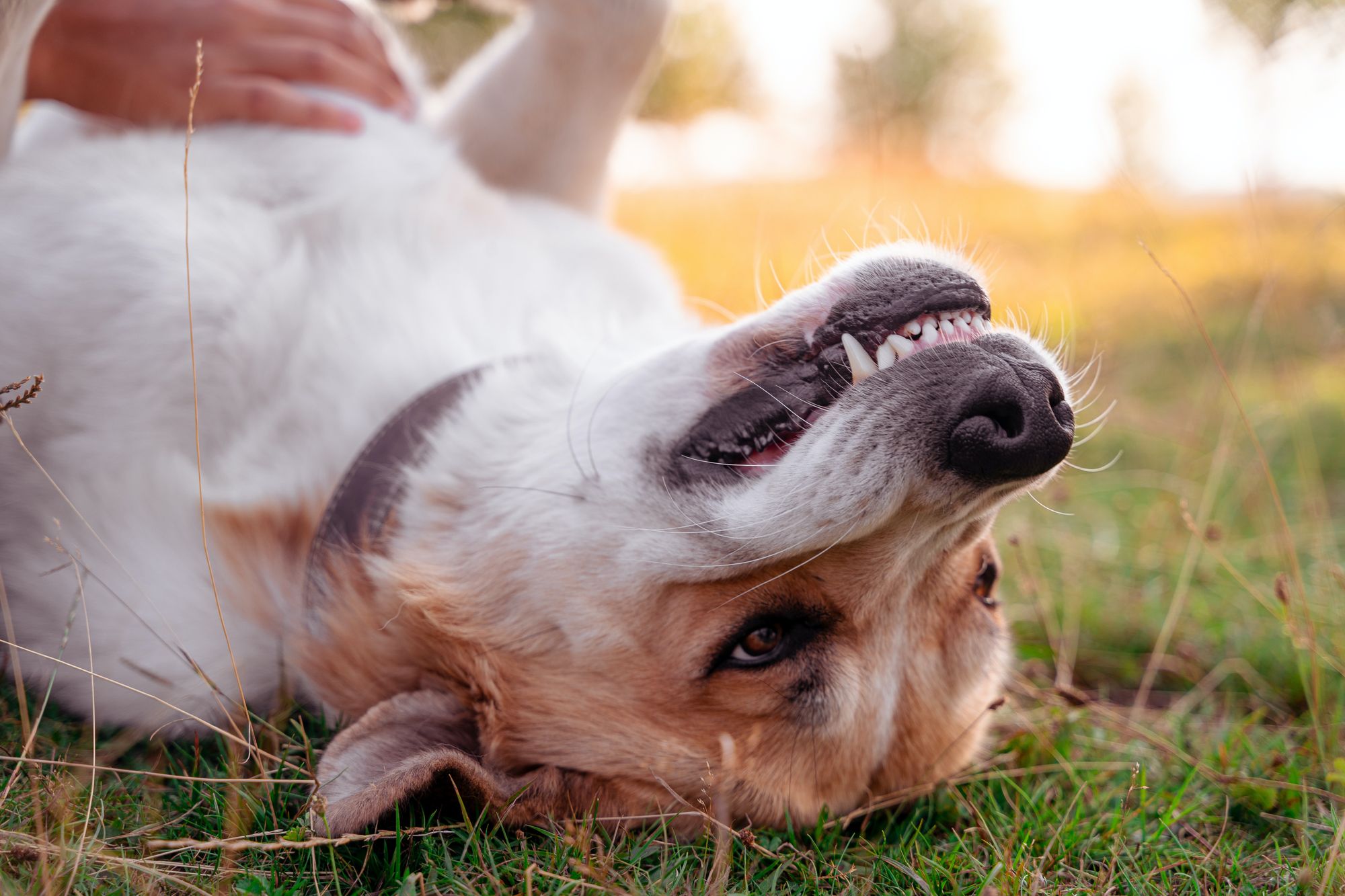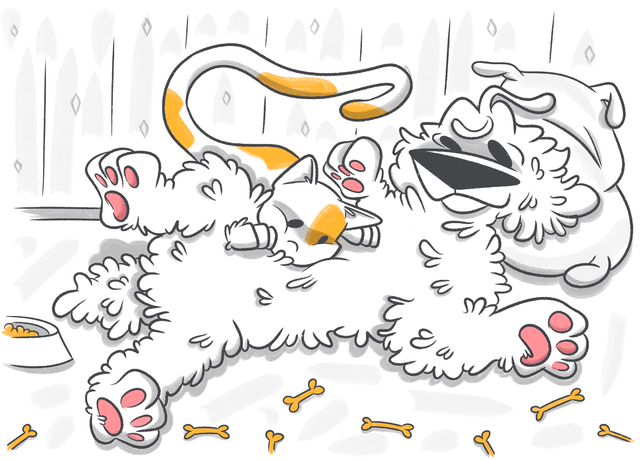If your dog’s stomach is harder, firmer, or larger than usual, do not panic. This symptom can just as easily be associated with a simple case of overeating as it can with more serious causes, such as cancer. Panicking won’t get you anywhere, and it won’t help your pet, but getting your four-legged friend to the vet will.
Here’s what you need to know if your dog’s stomach is hard and/or bloated.
Stop Googling - Ask a Real Vet
Content:
- My Dog Has a Hard and Bloated Stomach
- Dog Has a Hard But Not Bloated Stomach
- My Dog Has a Hard Stomach and is Shaking
- My Dog Has a Hard Stomach But Acting Normal
- Why Is The Stomach of My Puppy Hard
- Conclusion
My Dog Has a Hard and Bloated Stomach
There are several causes behind hard and bloated stomachs in dogs, which is why it is important to take them to the vet and get them checked out as soon as you can. Early symptoms of most conditions or problems in dogs are usually very vague, and even a symptom as focused as a hard, bloated stomach can have many different underlying causes.
Blockages
Take a look at the footage of your Petcube Camera to see if your pup has swallowed something they shouldn’t, such as toys, household items, or human food. Blockages of the digestive and bowel systems can cause material to back up, in the same way that hair can cause a blockage in the pipe that leads away from your shower. Material cannot pass without removing the blockage, and this can sometimes require surgery.
Cushing’s Disease
A ‘potbelly’ look is quite common for canines suffering from Cushing’s disease or syndrome, also known as hyperadrenocorticism. Humans can also suffer from the condition, as can cats. According to the FDA, it is more common in dogs than cats.
Fairly common in older dogs aged eight years and older, Cushing’s disease is almost always caused by tumors on the pituitary gland, but long-term use of medications such as steroids can also be the culprit.
Beagles, Boston Terriers, Dachshunds, Poodles, and Boxers have a higher chance of developing the disease.
Others
These aren’t the only causes of hard and bloated stomachs in dogs. Other medical conditions and issues that can cause the symptom include:
- Gas buildup;
- Overeating;
- Trauma or injury;
- Abdominal bleeding, also known as hemoabdomen;
- Fluid buildup in the abdomen, also known as ascites;
- Bloat in dogs;
- Roundworm infection;
- Gastric dilatation volvulus, also known as twisted stomach.
Dog Has a Hard But Not Bloated Stomach
If your dog’s stomach is hard but doesn’t show signs of bloating, you should still seek medical advice. Your pet could still suffer from one of the above conditions in the early stages, and there are other, potentially dangerous causes of a rock-hard stomach without bloating.
Pregnancy
Do you have a female, unneutered dog? Early pregnancy can cause a hard stomach in dogs, with the obvious distension (bloating or enlarging) coming a few weeks or months later.
Other common symptoms in early doggy pregnancy include vomiting (morning sickness), discharge from the vagina, eating more or less, showing you and others more affection, enlarging of the nipples in preparation for feeding pups, and more lethargic behavior.
Peritonitis
This condition is deadly if not diagnosed and treated. It can develop due to ulcers in the intestines, eating a toy or other inedible items, gastrointestinal ruptures, surgical suture ruptures, organ ruptures (such as the uterus and bladder), viral and bacterial infections, fungal infections, and parasites.
Your dog will likely need to spend time in the hospital for treatment, which will combine intravenous drugs and fluids, antibiotics, anti-inflammatory medications, and transfusions of both blood and plasma. The condition’s severity will dictate the required treatment.
Others
Other conditions can cause hard stomachs without bloating in dogs, and these include:
- Parvovirus;
- Other gastrointestinal infections;
- Sepsis;
- Benign tumors;
- Malignant (cancerous) tumors.
My Dog Has a Hard Stomach and is Shaking
Many of the conditions that cause stomach hardening or bloating have the potential to be dangerous and deadly. The MSD Veterinary Manual notes a mortality rate of 50% to 70% in canine peritonitis, and diagnosis often requires several tests.
X-rays, sample testing (urine, feces, abdominal fluid, blood), physical examinations, and more are necessary to properly diagnose it, which quickly boosts the cost of your bill. You can avoid this by signing up for the Petcube Emergency Fund, which pays for the cost of pet care up to $3,000 for just $29 per month.
My Dog Has a Hard Stomach But Acting Normal

Just because your dog is acting perfectly normally doesn’t mean that they aren’t suffering. Dogs can be in pain and still have the zoomies at three in the morning, and some dogs are so greedy that they’ll continue to eat even with a digestive blockage.
Always seek veterinary advice if your pet exhibits unusual behaviors or habits.
Most cases of a dog with a hard stomach still acting normally have overeating, eating too quickly and swallowing air, or a spot of constipation to blame. Quick treatment leads to a quick recovery, but without treatment, the problems will get worse.
Why Is The Stomach of My Puppy Hard
Puppies can and do suffer from almost all the same conditions as their adult counterparts, so all the diseases, syndromes, and other medical afflictions mentioned above could apply to your young pet.
Intestinal worms are the most common cause of firm tummies in small puppies. They might exhibit itchy-butt behavior but often don’t have other symptoms until much later. Diarrhea with mucus along with a bloated or hard tum could be a sign of whipworms, and if the feces are bloody, hookworms could be the cause.
The only way to find out why your pup’s stomach is bloated and/or hard is to make an appointment with a vet. It’s also the only way to get them treated.
Conclusion
The problem with a hard abdominal region in adults and young dogs is that it can be a sign of several conditions. You cannot pinpoint the cause by sight and feel alone, and you can’t treat the cause at home without veterinary assistance.
If you notice any changes in your pet’s appearance, behavior, or habits, have a chat with one of Petcube’s licensed and qualified vets, available around the clock with the Petcube Emergency Fund.
Was this article helpful?
Help us make our articles even better









